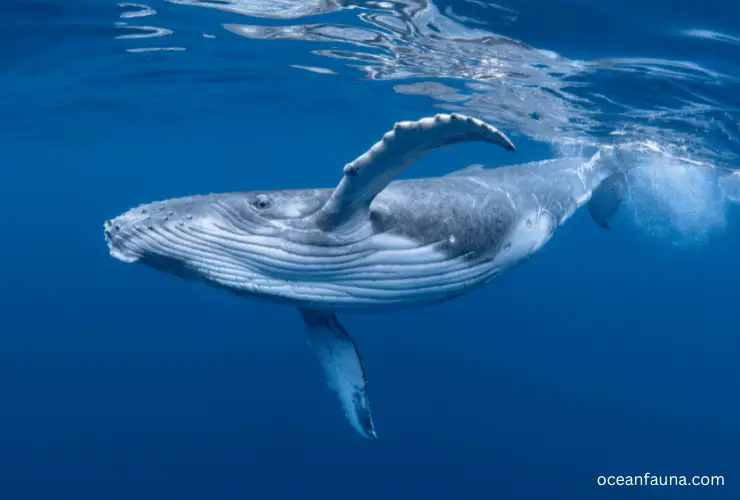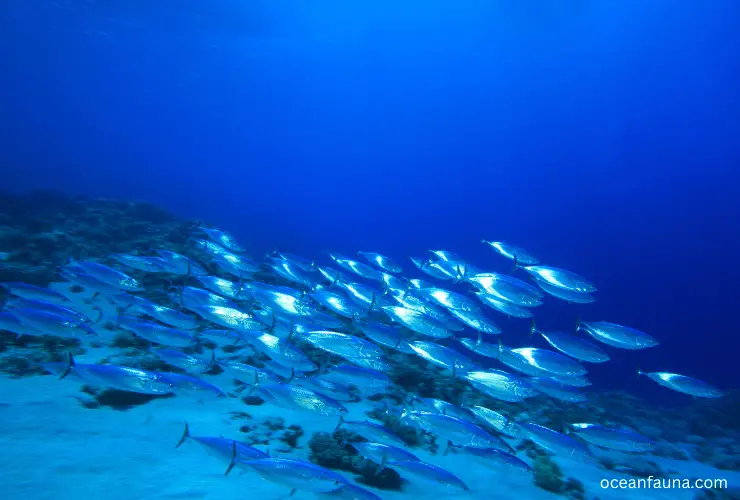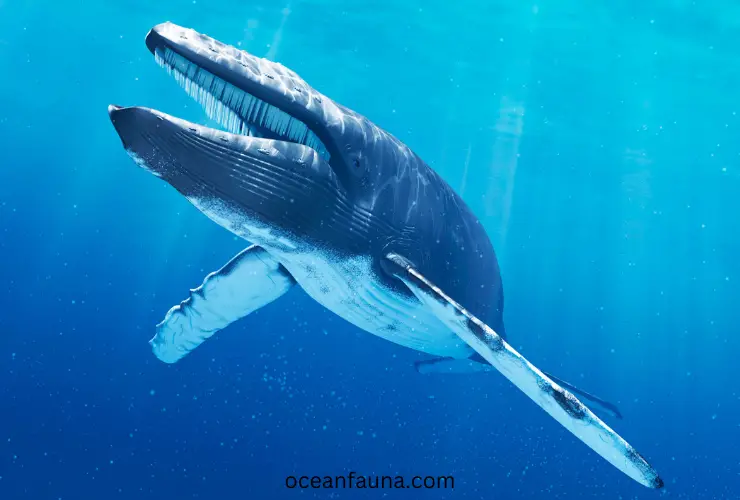Research says whales have a diverse diet that spans the entire food chain. Certain species indulge in swarms of zooplankton, such as copepods and euphausiids, commonly known as “krill.” Meanwhile, others prefer to feast on schools of fish.
However, do whales eat tuna? No, whales don’t usually eat tuna. But, you know what? Sometimes, these sneaky tunas end up in a whale’s gulp and become an unexpected snack.
In this blog, I will discuss this fact in more detail, including the probable reasons why whales don’t eat tuna. So read on to discover all the amazing facts about whales’ non-predation of tuna.
Do Whales Eat Tuna?

Whales are renowned for their colossal size and their ability to consume thousands of pounds of food each day. However, despite their insatiable appetites, whales do not typically include tuna in their regular diet. Instead, they are commonly seen feasting on plankton, krill, and small fish like herring, mackerel, and anchovies.
Nevertheless, it is not unheard of for a cunning tuna to find itself inadvertently taken in by a whale’s mighty gulp, becoming an accidental food. In fact, instances of whales unintentionally devouring fish such as tuna have been observed in various parts of the world. These occurrences often transpire when the whales open their expansive mouths to feed on schools of small fish, unwittingly allowing a stray tuna to swim right in.
However, when searching for whether whales feed on tuna, you may find references to killer whales preying on tuna. But you should know that killer whales are not actually whales but rather dolphins. Although killer whales, also known as orcas, do consume various types of fish, including tuna, they typically employ a group hunting strategy. Therefore, it would be more accurate to say that dolphins, not whales, feed on tuna.
Why Do Whales Not Eat Tuna?

Whales don’t indulge in larger fish like tuna or swordfish. In fact, they prefer to feed on swarms of zooplankton, such as krill or small fish schools. There are several reasons why whales avoid consuming tuna, which are elaborated below:
Tuna are swift swimmers
One of the primary reasons why whales don’t eat tuna is that tuna are fast swimmers. Tuna can swim at an impressive speed of up to 70 miles per hour, which makes them difficult to catch for whales. Whales prefer to conserve energy and avoid wasting it chasing fast-swimming prey. As a result, whales opt for slower prey, such as krill, which require less energy to catch.
Tuna have high mercury content
Tuna are known for their high mercury content, which can be harmful to both whales and humans. Mercury levels in tuna can vary based on their size, species, and location. However, studies have shown that the larger the tuna, the higher the mercury content. Whales, the top predators in the ocean, are susceptible to accumulating high levels of mercury in their bodies, which can adversely affect their health.
Tuna are not abundant in all areas
Tuna are not found in all oceans. They prefer warm waters, commonly found in the Pacific, Atlantic, and Indian Oceans. In areas where tuna are not abundant, whales have to rely on other food sources. Therefore, depending on their location, whales have adapted to other food sources, such as small fish, plankton, or even squid.
Tuna is not a natural food source for all whales
Not all whale species have adapted to feed on fish. For example, baleen whales, such as blue, humpback, or minke whales, feed on zooplankton, such as krill. Whereas toothed whales, such as orcas, prefer to feed on mammals, such as seals and sea lions. Therefore, tuna are not a natural food source for all whale species, and they prefer to feed on prey that is easier to catch and in line with their natural diet.
What If Whales Eat Tuna?

Whales, being the largest creatures on earth, are generally known to feed on tiny plankton, krill, and small fishes. They occasionally swallow fish such as mackerels, herrings, and anchovies but generally do not eat tuna. However, if they do consume tuna, it is merely accidental, and there are no adverse effects on whales’ health.
On the other hand, tuna is a type of fish high in protein and essential nutrients such as omega-3 fatty acids. However, they can also contain high levels of mercury, which can be harmful to animals that consume them in large amounts. These high levels of mercury can lead to neurological damage and affect reproductive health.
Despite the higher mercury content in tuna, when whales eat tuna in moderation, it is not harmful to their health. Whales’ digestive systems can effectively break down and digest tuna, eliminating any potential toxic effects. Moreover, while some species consume tuna, it is not considered a significant aspect of their diet.
In addition to their digestive capabilities, the sheer size of whales also contributes to their ability to consume tuna without experiencing any harmful effects. As they are much larger than most fish, their bodies can process larger amounts of food, allowing them to tolerate the high levels of mercury that tuna may contain.
FAQs
Which ocean mammals eat tuna?
As per marine biologists, killer whales (Orca) belong to the dolphin family and are the only marine mammals known to feed on tuna fish.
Are baleen whales capable of eating tuna?
No. Baleen whales, such as blue and humpback whales, are filter feeders and mainly consume krill, plankton, squid, and small fish. They do not have toothed jaws that are capable of tearing prey such as tuna into smaller pieces. Therefore, they are not able to eat tuna.
Do whales eat human-caught tuna?
No. Whales typically prefer to feed on their natural prey, such as krill, plankton, and small fish. Additionally, human-caught tuna may contain additives such as antibiotics or chemicals that could be harmful to whales. Therefore, it is not recommended for whales to eat human-caught tuna.
Conclusion
Now you have a detailed knowledge of whether whales eat tuna or not. It’s true that whales don’t eat tuna for various reasons like they are fast swimmers, have high mercury content, and not found in all oceans. But if whales consume tuna, it is accidental and doesn’t affect their health.
If you want to know more about whales’ eating behaviour, you may check out my article on what whales eat. If you have any questions, you may also ask in a comment. I will answer them as soon as possible.

